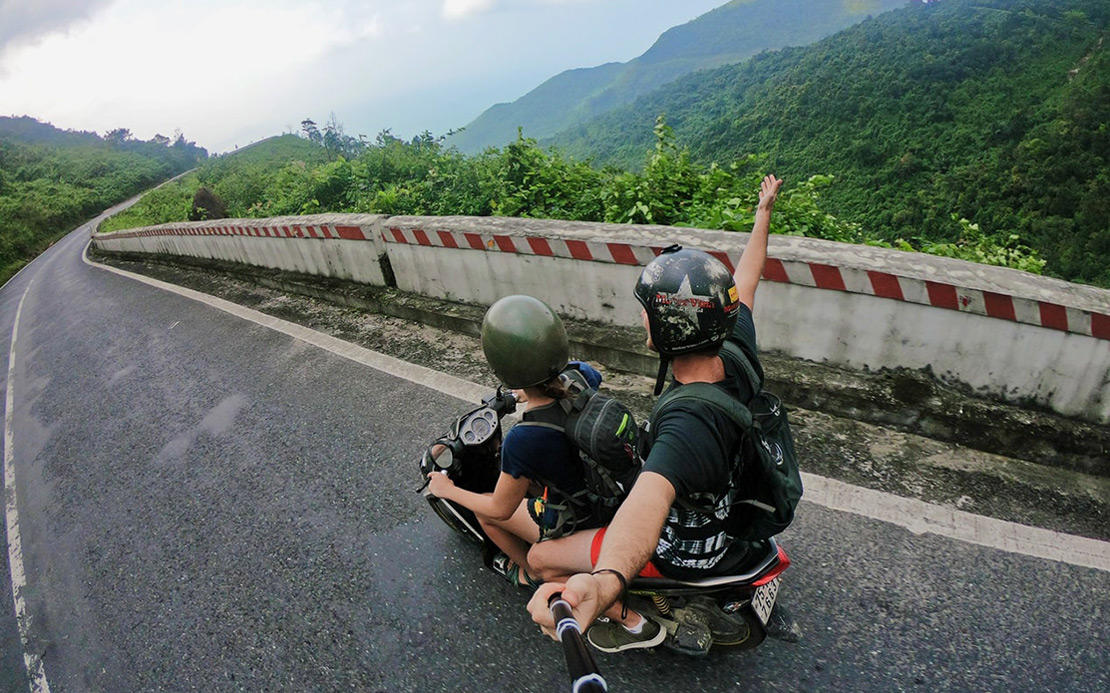Whether you’re dating or celebrating your 20th wedding anniversary, volunteering abroad can deepen your bonds and offer new views of your partner. Need proof? Here are six ways that doing good is good for your relationship.
Before Jordan McFadyen and his girlfriend Jacqueline volunteered with International Volunteer HQ in Kenya, a friend gave him some advice. If the duo’s relationship could survive the experience—working at a school in a Maasai village, pulling themselves from their comfort zone, dealing with unexpected situations—the two 28-year-olds were “meant to be” as a couple.
“It was kind of like the ultimate relationship test,” says McFadyen, marketing manager for the New Zealand-based IVHQ.
Some couple-teers don’t pass that test: “I have seen couples come out stronger after the experience, but there have been break-ups, too,” says a program officer for one volunteer organization.
McFadyen, however, found that working as a teacher’s assistant with Jacqueline strengthened their relationship. After serving in Kenya in 2009, the couple married and now has two children.
“We discovered (and re-discovered) all the attributes that we were attracted to when we first met,” he says—something that many couples have found when volunteering together.
“Volunteering is great as an individual, but it is especially fulfilling when you volunteer as a couple—and emerge as a team,” says love and relationship expert Dr. Pepper Schwartz, an author and star of the series Married at First Sight. “If you teach together, or work on almost anything that helps the lives of others, your mutual dependency and collaboration is a powerful bond. It far exceeds almost any other way of being together. It’s uplifting—and even romantic.”
How romantic? Generous, altruistic people are not only more attractive to the opposite sex, but they have more sex than their less generous counterparts, according to a study published in the July 2016 British Journal of Psychology. Volunteering together also establishes a foundation of generosity, which is vital for relationships to succeed. In a study conducted as part of the National Marriage Project, couples age 18-46 were five times more likely to say their marriage was “very happy” if they reported a high amount of generosity, compared to couples who didn’t. Volunteering might even be the new Match.com: 80 percent of volunteers would rather date someone they met volunteering than through a dating site, a survey by The Leukemia & Lymphoma Society found. Ten percent of survey respondents said that volunteering led to a romantic relationship, and six percent wound up saying “I do.”
Are you thinking about volunteering abroad with a boyfriend, girlfriend, or spouse? Here are six ways that serving others can improve your relationship.
Trending Guidebooks
Volunteering Abroad AFTER the Coronavirus Outbreak
Read 27,138 times2025 Best Internships Abroad: Medical Care, Marine Biology & More
Read 96,616 timesVolunteer in Australia: Animals, Conservation, Ranching and More
Read 52,694 times2025 Best Volunteer Abroad Programs, Organizations, and Projects
Read 3,688,005 times
1. You’ll become closer
Volunteering abroad can build emotional bonds between couples. Tom and Kathy Kromroy discovered this after volunteering with Global Volunteers for three weeks in the Cook Islands in 2009, and then for two weeks in India and St. Lucia in 2011 and 2013, where they worked with schools and community organizations.
“Being together in foreign places with new people, and doing different things, was powerful,” says Kathy, who lives with Tom in St. Paul, Minnesota. “We always had so much to talk about, each with our own perspective. Those weeks were so intense and made our relationship more solid.”
Janah and Steve Szewczyk of Philadelphia felt something similar after volunteering in the West Bank in 2009 via Volunteers for Peace. Working and living for two weeks in the Beit Jebrin refugee camp on the edge of Bethlehem was an emotional, unifying experience, they found.
“When we see news now about Bethlehem or the camps or towns, we have each other to discuss it—we can commiserate,” says Janah. After they returned home, they gave a talk about their volunteer work at their local church. It helped them not only to share what they had experienced—the checkpoints, the hardships of local life—but to process those experiences.
“I can’t imagine I would have gotten as much out of the trip,” says Steve, “without having someone so close to talk to about it once we were home.”
2. You’ll energize your relationship
When couples have been together for a long time, life can become a little… stale. Volunteering abroad can change that, yanking couples from their routines and providing a rut-busting jolt to their relationship.
“Research shows that when couples engage in an unusual experience together they feel more bonded and connected,” says Julia B. Colwell, Ph.D., author of The Relationship Skills Workbook. “Stepping into the unknown can rekindle each person’s sense of self and increase the connection that occurs by sharing an adventure.”
I discovered this when my wife Karen and I volunteered in Costa Rica and Kenya. Karen and I met in the sixth grade, and we’d been married for 15 years when we taught English at a rural elementary school in San Carlos, Costa Rica, through Cross-Cultural Solutions. Instead of trudging through our usual pay-the-bills-and-walk-the-dogs routine, we were suddenly developing lesson plans, working with students, and strategizing over the best ways to teach them. It was both nerve-wracking and gratifying, and the energy we invested in teaching students also energized us.
“We are creatures of habit,” says Schwartz, “but we are excited by novelty.”
3. You’ll gain a new view of your partner
When Janah and Steve volunteered in Palestine, a local college student they befriended turned 20—but he didn’t want to celebrate his birthday, Janah recalls.
“He said, ‘Why celebrate—all of my friends are in prison, what is there to celebrate this year?’ And Steve said, ‘Life is precious—we’re going to celebrate you.’” Cooking supplies were limited, but Steve figured out how to make crepes with flour and lemon juice and sugar spread. The student was touched by the gesture.
“I saw a thoughtful and caring side of Steve that I always knew was there, but I wasn’t expecting to see in such force,” says Janah.
Simple but generous acts can have long-term benefits, whether you’ve been married for 30 years or you’ve just started dating.
“I think the best thing you can do in a new relationship is show your compassionate side,” says Schwartz. “We all like people who have heart, and who have done things, rather than just said them. That reassures us about a person’s integrity and emotional capability. Admiration is an emotion that often leads to love—and in the case of a couple, it enriches and deepens your feelings for one another.”
4. You’ll discover that your partner has hidden skills
Ryan and Poukhan Anthony had been married for about a year when they volunteered with UBELONG in her native Laos. The Los Angeles couple volunteered for six months, working on a variety of projects, from agriculture to business development to construction and education. During their six-month stint, Poukhan was surprised to learn that Ryan, who ran his own software management company back home, was also “a superstar teacher.”
“I never saw Ryan teach before and I was hugely impressed,” she says. “He knows how to take a complex concept and simplify it in a way that not only engages students, but made them walk out of the classroom confident about their ability to learn.”
One day, as classes were ending, Poukhan peeked in the classroom window where Ryan was teaching high school students. None of them were rushing to leave, she noticed. They were still asking questions, writing things down, laughing, and talking.
“It doesn’t matter if someone is learning in a developing nation or in a rich nation: We all have had that teacher in our life who can stop time in the classroom, and you don’t stop learning even after stepping out of the class,” she says. “I saw Ryan as that teacher to those students because I’ve had that teacher in my life.”
Poukhan also gained more respect for Ryan “by seeing him in an environment where he had to figure a lot of things out, where answers didn’t come naturally. And he handled it with grace, without getting frustrated or upset. I also felt more respect from him because he let me lead when we were lost or trying to negotiate with locals. I was so proud that he learned the Lao language and adapted to their cultural norms so quickly! I saw how hard he worked to step out of his comfort zone and dive into the unknown.”
5. You’ll appreciate your partner more—and your life together
Giving back makes us feel good. Generosity ignites pleasure centers in the brain, as researchers at Harvard and Stanford Universities confirmed in a study using functional magnetic resonance imaging (fMRI) scanners. And the more people volunteer, the happier they are, a London School of Economics study found. Those emotional benefits apply not just to individuals, but to couples as well.
“The ‘helper’s high’—actual chemicals that increase when helping others—will increase connection within a couple,” says Colwell. “Helping others also intensifies core values that a couple is developing together—like service and living for higher principles.”
Kathy and Tom Kromroy found that acting on their shared values strengthened their relationship.
“My respect and love for Tom grew as I saw how he interacted with all the different team members and local people,” says Kathy. “The experiences were powerful—sharing them matured our relationship.”
This can also happen for newlyweds. For many couples, preparing for a wedding is time of excitement, joy—and massive self-absorption. That’s why some couples volunteer abroad for their honeymoon: To shift their focus from wedding cakes to the wider world. England-based Kaya Responsible Travel offers Honeymoon Volunteers programs specifically geared for newlyweds, in locations ranging from Mozambique to Nepal.
“Our honeymoon couples tell us that after the stress and self-focus of arranging their weddings, that volunteering gives them an opportunity to give back and appreciate all they have together,” says Heilwig Jones, director of Kaya Responsible Travel. “Couples are looking for something to remember the rest of their lives. Volunteering gives them that option of working on something they care about, and that they can be passionate about.”
Some couples also make their volunteer honeymoon the focus of their wedding gift, which is good for guests, who typically prefer contributing to a volunteer experience rather than buying steak knives from the gift registry.
“It sets the tone for their wedding as a couple sharing and spreading the love they are celebrating,” says Jones.
6. You’ll grow from the shared experience
“I 100 percent believe that volunteering strengthens your relationship,” says McFadyen of IVHQ. “You rely on each other so much more. You are not only a best friend but a teammate, working together at a common goal. It provided us with many new life lessons, which we hope will educate and inspire our children when they grow older.”
Shared meaning is one of the foundations of strong relationships, say Drs. John and Julie Gottman, founders of the Seattle-based Gottman Institute. The Gottmans have developed what they call the Sound Relationship House, based on nine components of healthy relationships. At the top of the relationship house—the attic—is “shared meaning,” which means “understanding important visions, narratives, myths, and metaphors about your relationship.” Volunteering, experts say, can provide those shared narratives.
“When we volunteer, and we show heart and purpose and determination, our partner sees our essence and forgets about the small irritations and disagreements,” says Schwartz. “We become a team engaged in something larger than ourselves.”
That’s one reason why a lot of couples say they can’t imagine volunteering alone.
“For me, it would have been much harder and more stressful, and probably less rewarding,” says Kathy of solo volunteering. “Going back to our room after long days was something I looked forward to. The experiences, the people, the landscapes—everything was so different from my normal daily life that I would have been frustrated if Tom was not there. Sometimes there were challenges, and it was a huge comfort to share those with Tom because he understood the situation.”
Overcoming challenges is one of the upsides of volunteering together. When Poukhan and Ryan left Laos, local border officials claimed their visa had expired. It was a frightening, frustrating situation that required teamwork and patience.
“I felt like experiencing the hard parts of volunteering was the biggest benefit,” says Poukhan. “That was where we had to draw more strength and learn how to work together.” And when that happens—when couples work together, learn together, serve together—the benefits usually continue long after they return home.
“Our partner sees the side of us that it is committed to a larger community,” says Schwartz of volunteering. “It is bound to open up each person’s heart in ways that day-to-day life rarely does.”
A life-changing experience, she says, can help you see each other in a new light, ‘til death do you part.





























Ken Budd · Author of 'The Voluntourist'
Ken Budd is the author of 'The Voluntourist' and the host of the 650,000 Hours web series. His writing credits include The New York Times, Smithsonian, National Geographic, The Washington Post, and many more.